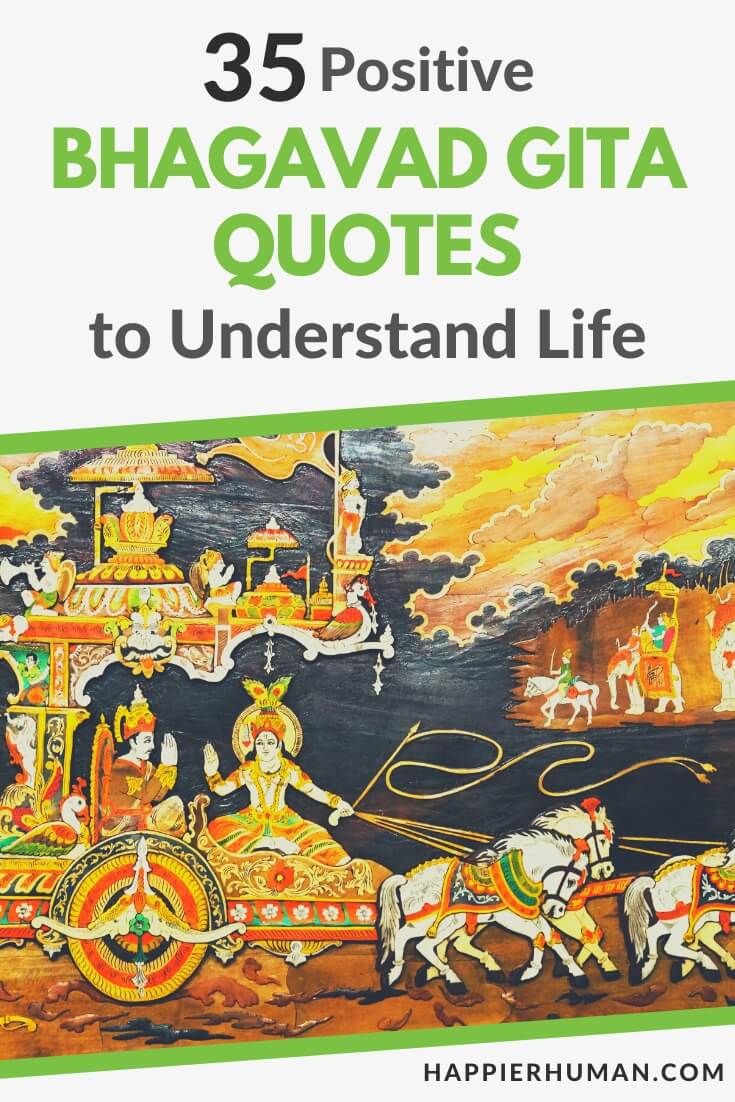If there is one thing that we all want out of life, it’s to be happy. Not just OK, or getting by. But completely and utterly happy.
It’s the reason why we change our jobs. Get our hair done. Go out for dinner. Buy a new phone, a puppy, a holiday… It’s all in aid of that eternal search for happiness.
And these things might bring it to us, momentarily at least. But when those novelties wear off, and we all know they will, what’s next?
If you’ve been faced with this or similar dilemmas, the Bhagavad Gita may offer you comfort. The ancient Sanskrit text speaks to those looking for a more fulfilled life. And these Bhagavad Gita quotes will help you to understand this on a deeper level.
Why Are the Bhagavad Gita Teachings So Important?
When we find something that brings joy to our lives, it’s understandable to want more of it.
More road trips out to fancy coffee shops. More impressive technology, with the latest phone or tablet. More trend-setting clothes to fill our already extensive wardrobes.
But whilst we may believe that these material-led moments bring us purpose and meaning, in reality, that void is never really filled. The need for ‘things’ to add substance to our lives, breeds greed and resentment. And our self-destructive fire only burns brighter.
The Bhagavad Gita teaches us that purpose is actually found in our journey, and not what we can get out of it. That we should focus less on the outcomes. And more on living our lives with intention.
This can be hard to put into practice. But by walking a path of self-discovery, you can determine what’s truly important to you. You’ll find courage to confront the challenges ahead of you. And give yourself wholly to the life you've created.
Although the Bhagavad Gita was written around five thousand years ago, the teachings are as relevant today as they were to the ancient Yogi. They encourage us to live our lives with strength, discipline, kindness, and integrity. And to put trust in ourselves throughout our journey.
Now, take time to read these Bhagavad Gita quotes. Find warmth in their teachings. And know that your life has purpose. You just need to believe in yourself.
35 Positive Bhagavad Gita Quotes to Understand Life
- “You are what you believe in. You become that which you believe you can become.”
- “Those established in Self-realization control their senses instead of letting their senses control them.”
- “Self-control is the Mantra of Success”
- “Perform your obligatory duty, because action is indeed better than inaction.”
- “We are not cabin-dwellers, born to a life cramped and confined; we are meant to explore, to seek, to push the limits of our potential as human beings. The world of the senses is just a base camp: we are meant to be as much at home in consciousness as in the world of physical reality.”
We are not cabin-dwellers, born to a life cramped and confined; we are meant to explore, to seek, to push the limits of our potential as human beings. The world of the senses is just a base camp: we are meant to be as much at home in consciousness as in the world of physical reality.”
- “All that we are is the result of what we have thought. We are made of our thoughts; we are molded by our thoughts.”
- “Meet this transient world with neither grasping nor fear, trust the unfolding of life, and you will attain true serenity.”
- “Thus the Gita places human destiny entirely in human hands. Its world is not deterministic, but neither is it an expression of blind chance: we shape ourselves and our world by what we believe and think and act on, whether for good or for ill.”
- “Selfish action imprisons the world. Act selflessly, without any thought of personal profit.”
- “Live a well-balanced life, it will bring peace.”

- “Whatever happened, happened for the good, Whatever is happening, is happening for the good. Whatever will happen, will also happen for the good.”
- “On this path effort never goes to waste, and there is no failure. Even a little effort toward spiritual awareness will protect you from the greatest fear.”
- “Set thy heart upon thy work, but never on its reward.”
- “Calmness, gentleness, silence, self-restraint, and purity: these are the disciplines of the mind.”
- “Seek refuge in the attitude of detachment and you will amass the wealth of spiritual awareness. The one who is motivated only by the desire for the fruits of their action, and anxious about the results, is miserable indeed.”
Seek refuge in the attitude of detachment and you will amass the wealth of spiritual awareness. The one who is motivated only by the desire for the fruits of their action, and anxious about the results, is miserable indeed.”
- “We must act in a selfless spirit, Krishna says, without ego-involvement and without getting entangled in whether things work out the way we want; only then will we not fall into the terrible net of karma. We cannot hope to escape karma by refraining from our duties: even to survive in the world, we must act.”
- “His judgment will be better and his vision clear if he is not emotionally entangled in the outcome of what he does.”
- “Through selfless service, you will always be fruitful and find the fulfillment of your desires.”
- “The effort never goes waste, and there is no failure. Even a little effort toward spiritual awareness will protect you from the greatest fear.”
- “Detachment from material things is the way to inner peace.”

- “Love, tolerance, and selflessness should be practiced.”
- “We ourselves are responsible for what happens to us, whether or not we can understand how. It follows that we can change what happens to us by changing ourselves; we can take our destiny into our own hands.”
- “Actions do not cling to me because I am not attached to their results. Those who understand this and practice it live in freedom.”
- “If you want to see the brave and bold, look to those who can return love for hatred.”
- “The happiness which comes from long practice, which leads to the end of suffering, which at first is like poison, but at last like nectar – this kind of happiness arises from the serenity of one’s own mind.”
The happiness which comes from long practice, which leads to the end of suffering, which at first is like poison, but at last like nectar – this kind of happiness arises from the serenity of one’s own mind.”
- “Perform all work carefully, guided by compassion.”
- “A gift is pure when it is given from the heart to the right person at the right time and the right place, and when we expect nothing in return.”
- “The spirit is beyond destruction. No one can bring an end to spirit which is everlasting.”
- “It is better to live your own destiny imperfectly than to live an imitation of somebody else’s life with perfection.”
- “If you want to be Great, Think Great and Positive.”

- “This pleasure, which appears as poison in the beginning but is like nectar in the end, comes by the grace of Self-knowledge.”
- “Be calm, Do love and practiced selflessness.”
- “There is nothing lost or wasted in this life.”
- “World’s well-being starts with self-sacrifice.”
- “One should strive and employ oneself to uplift oneself. One should never dishonor oneself. The self is one’s friend as well as one’s enemy.”
Final Thoughts on Bhagavad Gita
The search for happiness and fulfillment is one we’ve all taken. It often comes after a difficult time, such as a breakup or job redundancy. And can feel quite overwhelming.
But whilst you might be tempted to buy a new coat, or adopt a lost kitten, the Bhagavad Gita teachings encourage you to find it from within. To open your heart, and live your life, with every ounce of integrity you have.
To live it fully. With purpose. And trust in yourself.
If you’re looking for more inspirational quotes, be sure to check out these blog posts:
- 63 Inspiring Walt Whitman Quotes About Life
- 67 Self-Reflection Quotes to Help You Grow as a Person
- 57 Pema Chodron Quotes About Love, Life, and Gratitude
Finally, if you want to use these quotes to make a lasting change to your life, then check out and recite these 57 affirmations for success.

Rebel Jones has been writing from a young age. She first used poetry to organise words – the rhythm and flow brought peace to her chaos. But as she developed (both as a person and as a writer), she embraced her offbeat thought process and found her own style and tone. Writing is definitely her happy place and one that she’s happy to share with the world.


